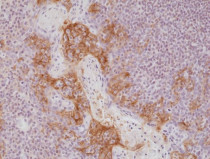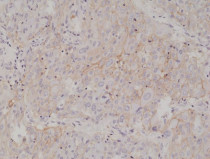ARG57681
anti-CD274 / PD-L1 antibody [RM320]
anti-CD274 / PD-L1 antibody [RM320] for ICC/IF,IHC-Formalin-fixed paraffin-embedded sections,Western blot and Human
Overview
| Product Description | Rabbit Monoclonal antibody [RM320] recognizes CD274 / PD-L1 |
|---|---|
| Tested Reactivity | Hu |
| Tested Application | ICC/IF, IHC-P, WB |
| Host | Rabbit |
| Clonality | Monoclonal |
| Clone | RM320 |
| Isotype | IgG |
| Target Name | CD274 / PD-L1 |
| Antigen Species | Human |
| Immunogen | Synthetic peptide around the C-terminus of Human PD-L1. |
| Conjugation | Un-conjugated |
| Alternate Names | Programmed cell death 1 ligand 1; B7-H1; B7H1; PDL1; PDCD1 ligand 1; B7 homolog 1; PD-L1; CD antigen CD274; PDCD1L1; B7-H; Programmed death ligand 1; PDCD1LG1 |
Application Instructions
| Application Suggestion |
|
||||||||
|---|---|---|---|---|---|---|---|---|---|
| Application Note | * The dilutions indicate recommended starting dilutions and the optimal dilutions or concentrations should be determined by the scientist. |
Properties
| Form | Liquid |
|---|---|
| Purification | Purification with Protein A. |
| Buffer | PBS, 0.09% Sodium azide, 50% Glycerol and 1% BSA. |
| Preservative | 0.09% Sodium azide |
| Stabilizer | 50% Glycerol and 1% BSA |
| Storage Instruction | For continuous use, store undiluted antibody at 2-8°C for up to a week. For long-term storage, aliquot and store at -20°C. Storage in frost free freezers is not recommended. Avoid repeated freeze/thaw cycles. Suggest spin the vial prior to opening. The antibody solution should be gently mixed before use. |
| Note | For laboratory research only, not for drug, diagnostic or other use. |
Bioinformation
| Database Links | |
|---|---|
| Gene Symbol | CD274 |
| Gene Full Name | CD274 molecule |
| Background | CD274 / PD-L1 is an immune inhibitory receptor ligand. It is expressed by hematopoietic and non-hematopoietic cells, such as T cells and B cells and various types of tumor cells. The encoded protein is a type I transmembrane protein that has immunoglobulin V-like and C-like domains. Interaction of this ligand with its receptor inhibits T-cell activation and cytokine production. During infection or inflammation of normal tissue, this interaction is important for preventing autoimmunity by maintaining homeostasis of the immune response. In tumor microenvironments, this interaction provides an immune escape for tumor cells through cytotoxic T-cell inactivation. Expression of this gene in tumor cells is considered to be prognostic in many types of human malignancies, including colon cancer and renal cell carcinoma. Alternative splicing results in multiple transcript variants. [provided by RefSeq, Sep 2015] |
| Function | CD274 / PD-L1 plays a critical role in induction and maintenance of immune tolerance to self (PubMed:11015443, PubMed:28813417, PubMed:28813410). As a ligand for the inhibitory receptor PDCD1/PD-1, modulates the activation threshold of T-cells and limits T-cell effector response (PubMed:11015443, PubMed:28813417, PubMed:28813410). Through a yet unknown activating receptor, may costimulate T-cell subsets that predominantly produce interleukin-10 (IL10) (PubMed:10581077). The PDCD1-mediated inhibitory pathway is exploited by tumors to attenuate anti-tumor immunity and escape destruction by the immune system, thereby facilitating tumor survival (PubMed:28813417, PubMed:28813410). The interaction with PDCD1/PD-1 inhibits cytotoxic T lymphocytes (CTLs) effector function. The blockage of the PDCD1-mediated pathway results in the reversal of the exhausted T-cell phenotype and the normalization of the anti-tumor response, providing a rationale for cancer immunotherapy. [UniProt] |
| Cellular Localization | Cell membrane and Endomembrane system. |
| Highlight | Related products: PD-L1 antibodies; PD-L1 ELISA Kits; Anti-Rabbit IgG secondary antibodies; Related news: The best solution for PD-1/PD-L1 research Examining CTL/NK-mediated cytotoxicity by ELISA |
| Calculated MW | 33 kDa |
Images (3) Click the Picture to Zoom In
-
ARG57681 anti-CD274 / PD-L1 antibody [RM320] IHC-P image
Immunohistochemistry: Formalin-fixed and paraffin-embedded Human tonsil tissue section stained with ARG57681 anti-CD274 / PD-L1 antibody [RM320] at 1:1000 dilution.
-
ARG57681 anti-CD274 / PD-L1 antibody [RM320] WB image
Western blot: H1975, DU145 and LNCaP cell lysates stained with ARG57681 anti-CD274 / PD-L1 antibody [RM320] at 1:1000 dilution.
-
ARG57681 anti-CD274 / PD-L1 antibody [RM320] IHC-P image
Immunohistochemistry: Formalin-fixed and paraffin-embedded Human lung cancer tissue section stained with ARG57681 anti-CD274 / PD-L1 antibody [RM320] at 1:1000 dilution.
Specific References










